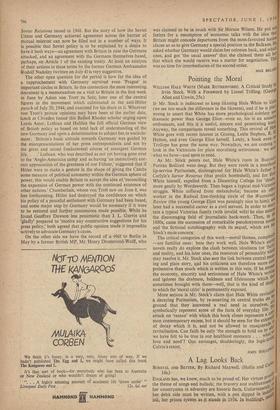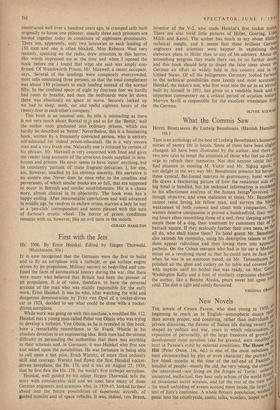A Lag Looks Back
BORSTAL AND BETTER. By Richard Maxwell. (Hollis and Cs
16s.) vidl
ENGLAND has, we know, much to be proud of. Her virtues Pr°0I the theme of songs and ballads; the bravery and stubbornness 0 her countrymen in adversity are historic facts. Unfortunatell her debit side must be written, with a pen dipped in indeoll ink, her prison system as it stands in .1956. In buildings, Ill
constructed well over a hundred years ago, in cramped cells built originally to house one prisoner, usually three such prisoners are herded together today in conditions of nightmare promiscuity. There are, apparently, only two lavatories to each landing of 150 men and one is often blocked. Miss Rebecca West very recently, speaking on the radio, drew attention to this horror. Her words impressed me at the time and when I opened the book before me I found that what she said was amply con- firm...ed. Of Wandsworth Prison, Mr. Maxwell, a recent occupant, says, 'Several of the landings were completely overcrowded, most cells containing three persons, so that the total complement was about 150 prisoners to each landing instead of the normal fifty. In the confined space of eight by fourteen feet we hardly had room to breathe, and once the bedboards were let down there was absolutely no space to move. Securely locked up we had to sleep, wash, eat and spend eighteen hours of the twenty-four in each other's company.'
This book is an unusual one. Its title is misleading as there is not very much about Borstal in and as for the `Better,' well the author soon graduated into ordinary prisons, which can hardly be described as `better.' Nevertheless, this is a fascinating book, written by a frequently convicted person, who is entirely self-educated (or indeed prison-educated). He is a very sincere man and a very frank one. Naturally one is irritated by certain of his phrases. Mr. Maxwell is very concerned with food and gives the reader long accounts of the atrocious foods supplied in doss- houses and prisons. He never seems to have 'eaten' anything, but he constantly 'partook of these fragrant delicacies. 1, for one, am, however, touched by his obvious sincerity. His narrative is an austere one. Never does he once refer to the cruelties and perversions, of which similar books are so full, that are supposed to occur in Borstals and similar establishments. His is a chaste story, almost clinical in its objectivity. The book even has a happy ending. After innumerable convictions and well advanced in middle age, he resolves to eschew crime, marries a lady he met as a 'pen-club' correspondent and seems pleased with this turn of fortune's erratic wheel. The horror of prison conditions remains with us, however, like an evil taste in the mouth.
GERALD HAMILTON



































 Previous page
Previous page